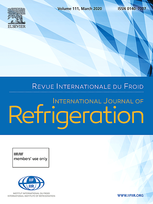
Recommended by the IIR / IIR document
Prediction of global warming potentials of refrigerants and related compounds from their molecular structure – An artificial neural network with group contribution method.
Author(s) : DEVOTTA S., CHELANI A., VONSILD A.
Type of article: IJR article
Summary
Global Warming Potentials (GWPs) of refrigerants and related compounds are calculated by complex simulation and periodically updated by World Meteorological Organisation (WMO). A new attempt has been made to predict GWPs of such compounds based on their molecular structure using Artificial Neural Network (ANN) and Group Contribution Method (GCM). The main focus is on refrigerants, including CFCs, HCFCs, HFCs, HFOs, HCs, chlorocarbons, fluorocarbons, bromocarbons, iodocarbons, oxygenated and unsaturated halocarbons. In order to give some statistical advantage to the ANN model, many other related families of compounds, totally about 495 compounds, have also been considered. Only GWPs for the time horizon of 100 years are used in this analysis. Considering the complexities of the problem and the confidence limits on GWP data published by WMO (2018), the proposed ANN with GCM model is able to predict the GWP within reasonable accuracy. A comparative analysis with another complex prediction method establishes the superiority of this direct GWP predictions from the molecular structure of a compound.
Available documents
Format PDF
Pages: 756-765
Available
Public price
20 €
Member price*
Free
* Best rate depending on membership category (see the detailed benefits of individual and corporate memberships).
Details
- Original title: Prediction of global warming potentials of refrigerants and related compounds from their molecular structure – An artificial neural network with group contribution method.
- Record ID : 30029181
- Languages: English
- Subject: Environment, HFCs alternatives
- Source: International Journal of Refrigeration - Revue Internationale du Froid - vol. 131
- Publication date: 2021/11
- DOI: http://dx.doi.org/10.1016/j.ijrefrig.2021.08.011
- Document available for consultation in the library of the IIR headquarters only.
Links
See other articles in this issue (95)
See the source
-
Recent and future trends in synthetic greenhous...
- Author(s) : RIGBY M., PRINN R. G., O'DOHERTY S., et al.
- Date : 2014/04
- Languages : English
- Source: Geophysical Research Letters - vol.41 - n.7
View record
-
The next generation of refrigerants: historical...
- Author(s) : CALM J. M.
- Date : 2008/11
- Languages : English
- Source: International Journal of Refrigeration - Revue Internationale du Froid - vol. 31 - n. 7
- Formats : PDF
View record
-
The next generation of refrigerants. 1.
- Author(s) : CALM J. M.
- Date : 2008/07
- Languages : Russian
- Source: Kholodilnaya Tekhnika - n. 7
- Formats : PDF
View record
-
The next generation of refrigerants. 2.
- Author(s) : CALM J. M.
- Date : 2008/08
- Languages : Russian
- Source: Kholodilnaya Tekhnika - n. 8
- Formats : PDF
View record
-
Effet de serre : émissions de CFC dans quinze ans.
- Author(s) : CLODIC D.
- Date : 1998/10
- Languages : French
- Source: Rev. gén. Froid - vol. 88 - n. 987
View record
